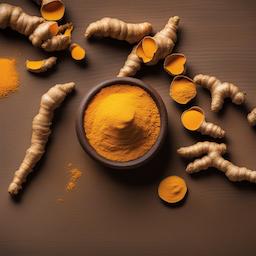Turmeric, also known as Curcuma longa, is a root plant that belongs to the ginger family. It is native to Southeast Asia and is commonly used in traditional Indian medicine for its various health benefits. The benefits of turmeric has been used for centuries for its anti-inflammatory, antioxidant, and antimicrobial properties. It is commonly used in cooking, but can also be taken in supplement form or applied topically.
Benefits of Turmeric

The active ingredient in turmeric is curcumin, which is responsible for its many health benefits. Curcumin is a powerful antioxidant that helps protect the body from free radicals, which can cause cell damage and contribute to chronic diseases. It also has anti-inflammatory properties, which can help reduce inflammation in the body and may be beneficial for conditions such as arthritis and other inflammatory disorders.
Here are some of the health benefits of turmeric and how to use it:
Anti-inflammatory properties
Curcumin has been shown to be a potent anti-inflammatory agent, and may help reduce inflammation in the body. Inflammation is a natural response to injury or infection, but chronic inflammation can contribute to the development of a range of chronic diseases, including heart disease, cancer, and Alzheimer’s disease. Studies have shown that curcumin may help reduce inflammation and may be beneficial for people with conditions such as arthritis, inflammatory bowel disease, and psoriasis.
Antioxidant properties
Turmeric is a powerful antioxidant that can help protect the body from free radicals. Free radicals are unstable molecules that can damage cells and contribute to the development of chronic diseases such as cancer, heart disease, and Alzheimer’s disease. Curcumin has been shown to be a potent antioxidant, and may help reduce the risk of these diseases.
Pain relief
Curcumin may help relieve pain and inflammation in the body. Studies have shown that curcumin may be beneficial for people with conditions such as osteoarthritis and rheumatoid arthritis, as well as other inflammatory disorders. It may also help relieve pain associated with exercise-induced muscle damage.
Digestive health
Turmeric may be beneficial for digestive health. Studies have shown that curcumin may help reduce inflammation in the gut and may be beneficial for people with conditions such as ulcerative colitis and Crohn’s disease. It may also help reduce symptoms of indigestion and may be beneficial for people with irritable bowel syndrome (IBS).
Brain health
Curcumin may be beneficial for brain health and may help reduce the risk of Alzheimer’s disease. Studies have shown that curcumin may help reduce inflammation in the brain and may help prevent the buildup of amyloid plaques, which are a hallmark of Alzheimer’s disease. It may also be beneficial for people with other neurological conditions, such as Parkinson’s disease.
Skin health
Turmeric may be beneficial for skin health. Studies have shown that curcumin may help reduce inflammation in the skin and may be beneficial for people with conditions such as eczema, psoriasis, and acne. It may also help reduce the signs of aging and may be beneficial for people with sun damage.
How to use turmeric
Turmeric can be used in a variety of ways, including cooking, supplement form, and topical application.
Cooking
Turmeric is commonly used in cooking and is a staple ingredient in many Indian and Southeast Asian dishes. It can be used to add flavor and color to a variety of dishes, including curries, rice dishes, soups, and stews. It can also be used to make tea or added to smoothies.
Supplements
Turmeric supplements are available in capsule, tablet, or liquid form. They typically contain curcumin, the active ingredient in turmeric, and are used to provide a concentrated dose of the compound.
Topical application
Turmeric can also be applied topically to the skin. It may be beneficial for people with conditions such as acne, eczema, and psoriasis. To use turmeric topically, mix turmeric powder with a carrier oil such as coconut oil or olive oil to make a paste. Apply the paste to the affected area and leave on for 10-15 minutes before rinsing off with warm water.
It’s important to note that turmeric may stain clothing and skin, so use caution when applying it topically.
Safety and precautions
While turmeric is generally considered safe, it may interact with certain medications and may not be appropriate for everyone. If you are pregnant, breastfeeding, or taking any medications, consult your healthcare provider before using turmeric.
Turmeric may also cause gastrointestinal side effects, such as nausea and diarrhea, in some people. If you experience any adverse effects, discontinue use and consult your healthcare provider.
Turmeric is a powerful root plant with many potential health benefits. It may be beneficial for reducing inflammation, protecting the body from free radicals, relieving pain, promoting digestive health, supporting brain health, and improving skin health. Turmeric can be used in a variety of ways, including cooking, supplements, and topical applications, but it’s important to use caution and consult with your healthcare provider if you have any concerns.
Keywords: turmeric, curcumin, anti-inflammatory, antioxidant, pain relief, digestive health, brain health, skin health, cooking, supplements, topical application, safety, benefits of turmeric, health benefits of turmeric, guide to benefits of turmeric, benefits of turmeric guide, best health benefits of turmeric, benefits of turmeric on health
Check out our Novel Writing Workbooks
Check out Little Tree Food Forest for articles on food forests and homesteading.
Check out FoodieScapes for articles on growing, fermenting and preserving food
Check out StoryScapes.World for articles on writing.
Subscribe to our newsletter to get information delivered to your inbox on homesteading, growing food, food preparation, travel, fishing, and more.











